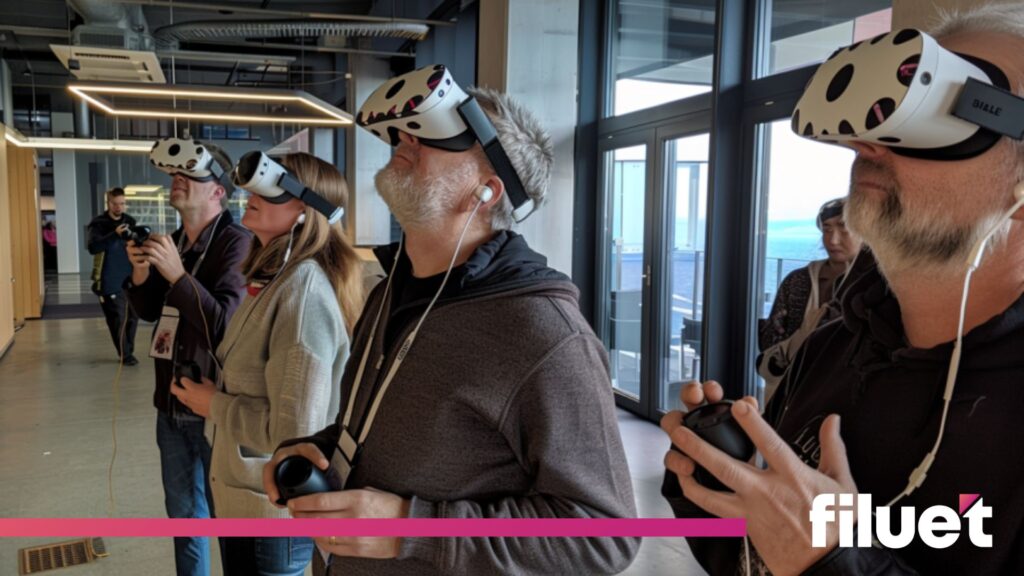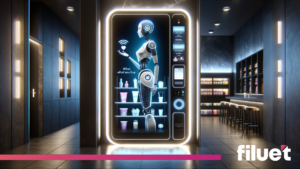We are living in a time when technology is reshaping every aspect of our lives, the field of education and development is witnessing a monumental change heralded by the advent of Virtual Reality (VR). Once an imaginary figment of science fiction, VR has now emerged as a fundamental tool, revolutionizing the learning process by offering immersive experiences that traditional methods cannot match. We at Filuet, a leader in facilitating global expansion, have embraced this innovation, pioneering the integration of VR into our partners’ training processes, including the creation of cutting-edge programs. This article deepens the essence of Virtual Reality, explores its diverse applications in various sectors, and highlights its transformative role in learning and training, underscoring Filuet’s commitment to leveraging VR for innovative corporate learning solutions.
What is Virtual Reality?
Virtual reality is an immersive technology that transports users into a digital environment where they can interact with a simulated world. Unlike traditional screen-based media, VR engages users in a 360-degree virtual space, offering a unique and immersive experience. From its beginnings as a nascent technology to its current status as a staple in entertainment and beyond, VR has evolved dramatically. Today it comes in various forms, from high-end tethered systems, which offer the most immersive experiences, to mobile VR, which makes virtual worlds accessible to everyone.
The Versatility of VR Applications
Virtual reality (VR) is revolutionising not only the world of video games, but also a multitude of industries, offering immersive and interactive experiences previously unimaginable.
Healthcare
Virtual reality is transforming health care, enabling medical professionals to conduct risk-free surgery and training. The incorporation of VR into surgical training by Johns Hopkins University and the Osso VR orthopaedic surgical training programs illustrate how VR can improve medical training and patient outcomes. This technology enables detailed practice and study without the ethical concerns or logistical challenges of traditional training.
Retailing
In the retail sector, VR is revolutionising the consumer experience by providing innovative ways for consumers to interact with products. IKEA‘s VR application, which allows customers to visualise furniture in their homes, is a prime example of how VR can increase customers’ confidence and satisfaction in their purchasing decisions. In addition, Walmart uses VR for employee training and management, demonstrating the potential of VR in improving customer and employee engagement through technology.
The automotive industry
The automotive industry is leveraging VR to redefine design processes and customer interactions. Ford is using VR in vehicle design, enabling a more efficient and collaborative creation process. Audi‘s virtual showrooms offer customers a unique opportunity to customise and test drive cars in a virtual environment, combining the convenience of online shopping with the tactile satisfaction of a test drive.
Education
The impact of VR on education is profound, offering students previously unimaginable immersive learning experiences. Google‘s Expeditions program allows students to take virtual field trips to global sites and museums, enriching the educational experience with unprecedented access to the wonders of the world, all from the comfort of the classroom.
Filuet is at the forefront of integrating VR into business solutions, recognizing its potential in delivering immersive experiences in any industry. From developing innovative training programs, such as VR technology to facilitating virtual product design and customer engagement strategies, Filuet is committed to harnessing the transformative power of VR. Our mission is to leverage VR technology to provide customised, cutting-edge solutions that meet the specific needs of our customers, paving the way for a future where VR is integral to industry innovation and growth. Take a look at what we can develop for you.
VR in Learning and Training
The adoption of Virtual Reality (VR) for learning and training is revolutionising the way knowledge is absorbed and skills developed.
VR’s ability to create immersive and interactive experiences surpasses traditional learning methods by enabling the simulation of real-world scenarios in a safe and controlled environment. This immersive nature not only increases engagement but also significantly improves learning retention. Studies, including those conducted by PwC, have shown that students in VR are up to four times more focused than their e-learning peers, which is indicative of VR’s ability to capture and maintain attention in educational settings. This learning efficiency not only reduces training time, but also translates into cost savings: in fact, according to the study, organisations can break even on their investment in VR training in about two years, taking advantage of VR’s scalability and reduced need for physical training resources.
PwC’s research also reveals that people trained through VR show more confidence in the application of the skills learned, compared to traditional training methods. This increase in confidence is attributed to VR’s experiential learning approach, which allows learners to practise and learn from mistakes without repercussions in the real world. In addition, people trained with VR were found to be 3.75 times more emotionally connected to the content than classroom learners and 40% of the VR learners saw an improvement in confidence, underscoring VR’s ability to make learning experiences more impactful and memorable through emotional engagement.
As VR technology continues to evolve, its application in education and training programs is set to expand, strengthening its role as a transformative tool in modern learning environments. These advances not only meet the current needs of companies and their workforce, but also pave the way for a future in which VR will be an integral part of training and development strategies around the world.
Filuet Training VR
Faced with the challenge of efficiently training new employees about products and selling techniques, Filuet was asked to develop an innovative solution. The result was an immersive training platform designed to educate employees in an interactive, engaging manner. This VR solution simulates real-life interactions and scenarios, from presenting new products to mastering sales strategies, all within a virtual space. The benefits have been profound: reduced training costs, greater accessibility, and notably improved retention of information among employees.
The Future of VR in Training
The future of VR in education promises an unprecedented level of immersion and realism, thanks to advances in technology. This leap in realism will not only improve the effectiveness of training in various fields, from health care to engineering, but also extend its applications to more fields where hands-on experience is valuable.
As VR technology becomes more affordable and scalable, it paves the way for widespread adoption. Declining hardware costs, combined with cloud-based VR services and advances in connectivity such as 5G, will democratise high-quality VR training, making it feasible for small businesses and educational institutions. This expanded access is expected to transform training methodologies globally, making sophisticated and immersive training programs a reality for a wider audience.
The integration of artificial intelligence (AI) into VR training will create adaptive learning environments that personalise the training experience in real time, optimising learning outcomes for each individual. This personalised approach will make training more efficient and effective by adapting to the learner’s unique learning needs and pace.
Conclusion
Virtual Reality is not just changing the game; it’s redefining the playbook for training and development. Through our developed project, Filuet has demonstrated the unparalleled benefits of integrating VR into training processes, from enhanced engagement to improved learning outcomes. As we look to the future, the possibilities are boundless. The question now is not if VR will become integral to training and development but how quickly organisations will embrace its potential. For those ready to leap into the future of training, the virtual door is wide open.





